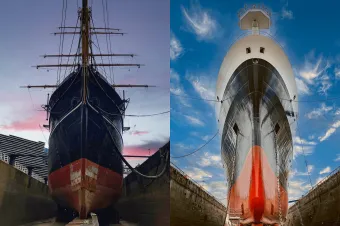
Today, 13 June, marks 100 years since the original Discovery – built in Dundee in 1901 for Captain Scott’s first Antarctic voyage – was designated a Royal Research Ship; the first of its kind.
To celebrate the centenary, the 2012 RRS Discovery, operated by the National Oceanography Centre to undertake modern-day oceanographic and marine science around the world, will be berthing in Dundee for several days in mid-September, and hosting various events in partnership with the Dundee Heritage Trust – the home of the 1901 Discovery. The 21st century RRS Discovery last visited the city of Discovery in 2023, to great acclaim – over 200 tickets to board the cutting-edge vessel and meet the crew sold out in a matter of hours.
Bookings for tickets to board the 2012 RRS Discovery during its Dundee visit in September will open later this summer. Subscribe to our newsletter to be the first to hear about the ticket release.
Dr John Siddorn, Chief Executive of the National Oceanography Centre, said “We are very excited to be coming back to Dundee and to bring modern ocean science and technology to life for everyone. Our scientists, engineers and technologists love these opportunities to demonstrate how the ocean impacts us all, and the career options that are possible.”
The beginnings of whale conservation
After being purchased by the Crown Agents in 1922 and undergoing a refit to equip it for oceanographic studies around the world, Discovery gained the title ‘RRS’ on 13 June 1925.
Discovery’s maiden voyage under its new moniker, RRS Discovery, saw the Dundee-built vessel return to the Southern Oceans once again, on a mission to research whale stocks; the migration pattern of whales; and provide a scientific basis for regulation of the whaling industry.
Emma Halford-Forbes, Heritage Director for Dundee Heritage Trust said, “Discovery’s impact on the planet and climate science is an important part of the story we tell in Dundee. We’re so pleased to welcome the 2012 RRS Discovery back to the city and explore our shared legacy of oceanographic impact.”
The 2012 RRS Discovery is owned and funded by UKRI-NERC.
ENDS
Notes to editors
The UK’s National Oceanography Centre (NOC) is one of the world’s top ocean research institutions. NOC’s scientists work around the globe, uncovering links between the ocean, climate change and biodiversity loss, to help every living thing on our planet flourish.
NOC solves challenging multidisciplinary, large scale, long-term marine science problems to underpin international and UK public policy, business and societal outcomes.
NOC is a company limited by guarantee set up under the law of England and Wales (11444362) and registered as a charity (1185265).
NOC operates the Royal Research Ships James Cook and Discovery and develops technology for coastal and deep ocean research.
Working with its partners NOC provides long-term marine science capability including: sustained ocean observations, mapping and surveying; data management and scientific research and advice.
Among the resources that the NOC provides on behalf of the UK are the British Oceanographic Data Centre (BODC), the Marine Autonomous and Robotic Systems (MARS) facility, the National Marine Equipment Pool (NMEP), the National Tide and Sea Level Facility (NTSLF), the Permanent Service for Mean Sea Level (PSMSL) and British Ocean Sediment Core Research Facility (BOSCORF).
About the Dundee Heritage Trust
Dundee Heritage Trust is the independent charity registered in 1985 that cares for the Royal Research Ship Discovery, two Recognised Collections of National Significance, and operates top-rated visitor attractions Discovery Point and Verdant Works Museum in Dundee.
Discovery Point is home to the RRS Discovery, along with over 12 interactive galleries showcasing 100+ Polar objects and the Discovery Dome; with British artist Luke Jerram’s ‘Gaia’ installation. RRS Discovery was built in Dundee in 1901 for Captain Scott’s first Antarctic expedition.